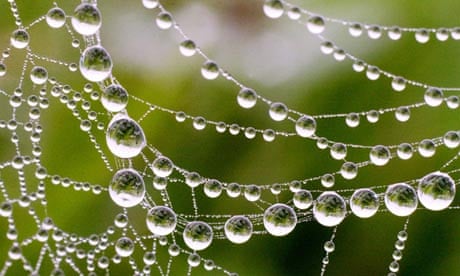As our world stumbles to the brink of ecological collapse, the "tipping point" of irreversible climate change, sustainability has become a vital issue. But in order to consider the question of sustainability, it is important to begin with the question: who or what is being sustained?
Does sustainability refer to sustained economic growth, and an environment that is able to maintain the status quo with our energy-intensive, consumer driven needs? Or does sustainability refer to the whole ecosystem, an interconnected web of life with its vast and rich diversity of species? What is the relationship between sustainability and the economy?
What kind of world do we want to sustain?
The first image of sustainability presents economic models of growth and energy efficiency, often with accompanying "green" ideas, such as green technologies or green energy, to help our civilisation develop. This is the corporate image of sustainability, orientated almost solely towards our human prosperity, with images of material progress that the environment is seen as supporting. This is sometimes referred to as "surface ecology".
The second image of sustainability is often referred to as "deep ecology", and it considers the ecosystem as a living whole of which humanity is only one part. In this complex web of interrelationships all species are dependent upon each other, and it is this organic pattern that needs to be sustained. No one part can be considered as separate from the whole, and the idea that the environment is just here to support us and our prosperity is a travesty of real environmental consciousness.
Deep ecology maintains that the idea of endless economic growth is unsustainable, and that business as usual will destroy the beauty and diversity of our world. It calls for new economic models, which respect and support the ecosystem of which we are a part.
The spiritual dimension
And there is another, deeper dimension to sustainability, which is as foundational as it is almost forgotten. Thomas Berry, a priest of the Passionist order and one of the leading voices in "eco-spirituality", said: "There is now a single issue before us: survival. Not merely physical survival, but survival in a world of fulfilment, survival in a living world, where the violets bloom in the springtime, where the stars shine down in all their mystery, survival in a world of meaning."
Berry suggested that there is a spiritual dimension to our present ecological crisis. It has long been understood by indigenous peoples that our relationship to the Earth is spiritually as well as physically sustaining. For indigenous peoples this is often included in their way of life, and expressed through their rituals and prayers.
In our Western culture we may sense this spiritual nourishment in the beauty, peace, or sense of wonder that the natural world gives us. This belongs to the quality of life rarely valued by our solely economic images of progress. And yet we are sustained in ways we cannot easily measure. In the words of Satish Kumar: "The contemporary environmental movement, in the main, follows the path of empirical science, rational thinking, data collection and external action. This is good as far as it goes but it doesn't go far enough. We need to include care of the soul as a part of care of the planet."
Disconnection
If we go to the root of the present ecological crisis we will find a state of disconnection. We appear frighteningly disconnected from real awareness of the effects of our materialistic culture upon the very ecosystem that supports us. The challenge is to develop a value-based economic structure, that is not concerned solely with our material well-being, but embraces the whole human being – body and spirit – as well as the rich biodiversity of the Earth.
The idea of a value-based economic structure is far more realistic than many of our present business models, which are short-sighted in the extreme. To quote Charles Eisenstein in Sacred Economics: "When we must pay the true price for the depletion of nature's gifts, materials will become more precious to us, and economic logic will reinforce, and not contradict, our heart's desire to treat the world with reverence and, when we receive nature's gifts, to use them well."
We need to explore ways that businesses can serve humanity in its deepest sense, rather than creating a poverty of spirit as well as an ecological wasteland – develop an awareness that the food we eat, the clothes we wear, the energy we use are not just commodities to be consumed, but part of the living fabric of a sacred Earth. Then we are making a real relationship with our environment.
This deepening of awareness may seem idealistic and impractical, but only a few decades ago organic farming, which respects the well-being of the soil, was considered uneconomic and idealistic. Now it is recognised as both environmentally and economically sustainable.
The next step is to reconnect with a way of life that respects and includes the soul as well as the soil, and encourage values-based businesses that respect both the individual and the environment. If we understand the importance of these values, and how central they are to the world we will leave to our children and grandchildren, we will find new ways that business can support these very human needs, and create an economic model that is not solely concerned with "surface ecology" but is sustainable for our deeper selves and for the whole ecosystem. This is one of the greatest challenges.
Llewellyn Vaughan-Lee PhD is a Sufi teacher and author. He has been interviewed by Oprah Winfrey on Super Soul Sunday, and featured on the Global Spirit Series shown on PBS. He is editor of the anthology, Spiritual Ecology: the Cry of the Earth.
This content is brought to you by Guardian Professional. Become a GSB member to get more stories like this direct to your inbox

Comments (…)
Sign in or create your Guardian account to join the discussion